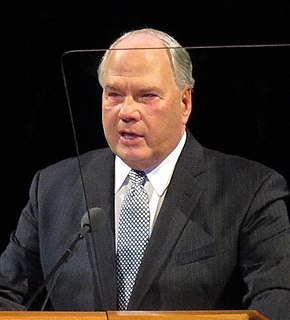A Quote by Richard Mant
Every deviation from the rules of charity and brotherly love, of gentleness and forbearance, of meekness and patience, which our Lord prescribes to his disciples, however it may appear to be founded on an attachment to Him and zeal for His service, is in truth a departure from the religion of Him, "the Son of Man," who "came not to destroy men's lives, but to save them.
Related Quotes
Never do I argue with a man with a desire to hear him say what is wrong, or to expose him and win victory over him. Whenever I face an opponent in debate I silently pray - O Lord, help him so that truth may flow from his heart and on his tongue, and so that if truth is on my side, he may follow me; and if truth be on his side, I may follow him.
When the Spirit came to Moses, the plagues came upon Egypt, and he had power to destroy men's lives; when the Spirit came upon Elijah, fire came down from heaven; when the Spirit came upon Gideon, no man could stand before him; and when it came upon Joshua, he moved around the city of Jericho and the whole city fell into his hands; but when the Spirit came upon the Son of Man, He gave His life; He healed the broken-hearted.
Every man, however hopeless his pretensions may appear, has some project by which he hopes to rise to reputation; some art by which he imagines that the attention of the world will be attracted; some quality, good or bad, which discriminates him from the common herd of mortals, and by which others may be persuaded to love, or compelled to fear him.
The man who barely abstains from violating either the person, or the estate, or the reputation of his neighbours, has surely very little positive merit. He fulfils, however, all the rules of what is peculiarly called justice, and does every thing which his equals can with propriety force him to do, or which they can punish him for not doing. We may often fulfil all the rules of justice by sitting still and doing nothing.
“When ye are in the service of your fellow beings ye are only in the service of your God.” Focusing on serving our brothers and sisters can guide us to make divine decisions in our daily lives and prepares us to value and love what the Lord loves. In so doing, we witness by our very lives that we are His disciples. When we are engaged in His work, we feel His Spirit with us. We grow in testimony, faith, trust, and love.
All things are God's already; we can give him no right, by consecrating any, that he had not before, only we set it apart to his service - just as a gardener brings his master a basket of apricots, and presents them; his lord thanks him, and perhaps gives him something for his pains, and yet the apricots were as much his lord's before as now.
Many years ago, our father Ibrahim (AS) made a choice. He loved his son. But He loved God more. The commandment came to sacrifice his son. But it wasn't his son that was slaughtered. It was his attachment to anything that could compete with his love for God. So let us ask ourselves in these beautiful days of sacrifice, which attachments do we need to slaughter?
If our Lord ascends up to Heaven, ascend with Him. Be one of those angels who escort Him, or one of those who receive Him. Bid the gates be lifted up (cf. Ps. 24:7, 10), or be made higher, that they may receive Him, exalted after His Passion. Answer to those who are in doubt because He bears up with Him His body and the tokens of His Passion, which He had not when He came down, and who therefore inquire, 'Who is this King of Glory?' that it is the Lord strong and mighty, as in all things that He has done from time to time and does, so now in His battle and triumph for the sake of Mankind.
He will be the best Christian who has Christ for his Master, and truly follows Him. Some are disciples of the church, others are disciples of the minister, and a third sort are disciples of their own thoughts; he is the wise man who sits at Jesus' feet and learns of Him, with the resolve to follow His teaching and imitate His example. He who tries to learn of Jesus Himself, taking the very words from the Lord's own lips, binding himself to believe whatsoever the Lord hath taught and to do whatsoever He hath commanded-he I say, is the stable Christian.
How easily we make things as way, truth, and life. Or, we call hot atmosphere as life, we label clear thought as life. We consider strong emotion or outward conduct as life. In reality, though, these are not life. We ought to realize that only the Lord is life. Christ is our life. And it is the Lord who lives out this life in us. Let us ask Him to deliver us from the many external and fragmentary affairs that we may touch only Him. May we see the Lord in all things-way, truth, and life are all found in knowing Him. May we really meet the Son of God and let Him live in us. Amen.
What a man does, that he has. What has he to do with hope or fear? In himself is his might. Let him regard no good as solid but that which is in his nature, and which must grow out of him as long as he exists. The goods of fortune may come and go like summer leaves; let him scatter them on every wind as the momentary signs of his infinite productiveness.
"Do you love me?"; "Are you my friend?". The One who scrutinizes hearts (cf. Rom 8:27), makes himself a beggar of love and questions us on the one truly essential issue, a premiss and condition for feeding his sheep, his lambs, his Church. May every ministry be based on this intimacy with the Lord; living from him is the measure of our ecclesial service which is expressed in the readiness to obey, to humble ourselves, as we heard in the Letter to the Philippians, and for the total gift of self.
[A]s a commencement the Lord appeared unto Joseph Smith, both the Father and the Son, the Father pointing to the Son said, "this is my beloved Son in whom I am well pleased, hear ye him" Here then, was a communication from the heavens made known unto man on the earth, and he at that time came into possession of a fact that no man knew in the world but he, and that is that God lived, for he had seen him, and that his Son Jesus Christ lived, for he also had seen him.





































